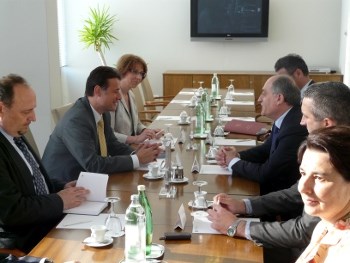Ministers held the meeting in their functions as co–chairmen of the Mixed Croatia-Montenegro Commission for the preparation of the legal procedure for drawing the sea border between Croatia and Montenegro before the International Court of Justice at The Hague. On this occasion they considered everything that has been done since the first meeting in January 2009. They have agreed on the continuation of the Commission’s work and proposed holding its next, second formal session, at which the two sides would have a chance to analyse in detail all the proposed texts of the Special Agreement. Through this Agreement, the two countries would present the dispute before the International Court of Justice at The Hague.
Minister Jandroković stressed that the Republic of Croatia considers reaching an agreement and signing of the Special Agreement to be very important, since it would allow creating the conditions for drawing the sea border in accordance to the highest international standards of peaceful settlement of disputes. Ministers agreed this manner of settling the dispute would additionally strengthen the development of neighbourly relations. Furthermore, they assessed that the manner in which the Republic of Croatia and Montenegro are settling the dispute is in accordance with the European spirit of good neighbourly relations and may serve as an example to the entire region. They also agreed that the issue of sea border is not an open issue either for the Republic of Croatia or Montenegro.
Ministers also agreed that this issue is being resolved without any pressure or time limitation and with the purpose of finding a solution acceptable to both sides as soon as possible.
Stating that the Republic of Croatia strongly supports Montenegro on its path to Euro–Atlantic integration, Minister Jandroković again emphasised Croatia’s readiness to pass on the knowledge and experience from the accession process. Moreover, both sides expressed support to all the countries of the region in their processes of Euro–Atlantic integration, with firm belief that their membership in the European Union and NATO guarantees long–term stability in the region as well as entire Europe.
Press releases


